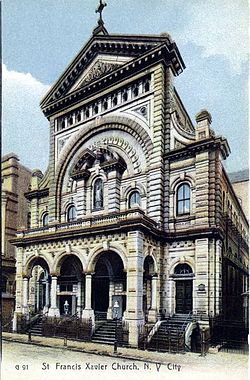St. Francis Xavier Church (Manhattan)
40°44′18″N 73°59′43″W / 40.738279°N 73.995152°W
| St. Francis Xavier Church | |
|---|---|
 | |
 | |
| General information | |
| Town or city | New York City |
| Country | United States of America |
| Client | Roman Catholic Archdiocese of New York |
| Website | |
| St. Francis Xavier Church, Manhattan (Flatiron) | |

St. Francis Xavier Church is a Roman Catholic church in Manhattan at 30–36 West 16th Street between Fifth Avenue and the Avenue of the Americas (Sixth Avenue) in the Flatiron District neighborhood of Manhattan, New York City.
History
The original church was founded in 1851 by Jesuits from the village of Fordham.[1][2] Its original sanctuary, designed by William Rodrigue, was the scene of a panic on March 8, 1877 when someone shouted "Fire!" in the church during a Mass; seven people died.[3] This church was torn down in 1878.
Architecture
The cornerstone of the new church was laid in May, 1878 on land immediately to the west of the old church. Built over the next four years, the current church has been in use since 1882. Designed by Irish-born architect Patrick Charles Keely in a "Roman Basilica" style,[1]—the church has a Neo-baroque exterior[4] with a façade of bluish-gray granite quarried from Monson, Massachusetts by the W.N. Flynt Granite Co..[5] The main entrance is sheltered by a arcaded portico. The stained-glass windows in a pre-Raphaelite style,[6] are by the Morgan brothers, frequent collaborators of Keely. The church was dedicated by Archbishop Michael Corrigan on December 3, 1882.[7]
A campaign for the extensive restoration and preservation of the church began in 2001 and was completed in 2010 under the direction of EverGreene Architectural Arts and Thomas A. Fenniman, architect.[3][8][9]
Popular culture
The church was featured in the 2014 film John Wick, as a front for the Russian mob.
See also
References
- Notes
- ^ a b Gray, Christopher. "Streetscapes: West 16th Street; A Side-Street Surprise: A Monumental Church" New York Times (March 27, 2005)
- ^ Remigius Lafort, S.T.D., Censor, The Catholic Church in the United States of America: Undertaken to Celebrate the Golden Jubilee of His Holiness, Pope Pius X. Volume 3: The Province of Baltimore and the Province of New York, Section 1: Comprising the Archdiocese of New York and the Diocese of Brooklyn, Buffalo and Ogdensburg Together with some Supplementary Articles on Religious Communities of Women.. (New York City: The Catholic Editing Company, 1914), p.326.
- ^ a b Dunlap, David W. (2004). From Abyssinian to Zion: A Guide to Manhattan's Houses of Worship. New York: Columbia University Press. ISBN 0-231-12543-7., p.204
- ^ White, Norval & Willensky, Elliot (2000). AIA Guide to New York City (4th ed.). New York: Three Rivers Press. ISBN 978-0-8129-3107-5., p. 192
- ^ Vander Weyde, Peter Henri (1888). The Manufacturer and Builder, Volume 20. pp. 83–84.
- ^ "St. Francis Xavier Church" on NYC Architecture.com
- ^ "Church of St. Francis Xavier", NYC AGO
- ^ Saint Francis Xavier: Restoration history Archived 2011-04-10 at the Wayback Machine
- ^ Bahamón, Alejandro and Losantos, Àgata. New York: A Historical Atlas of Architecture (New York: Black Dog and Leventhal Publishers, Inc., 2007), p.99.


